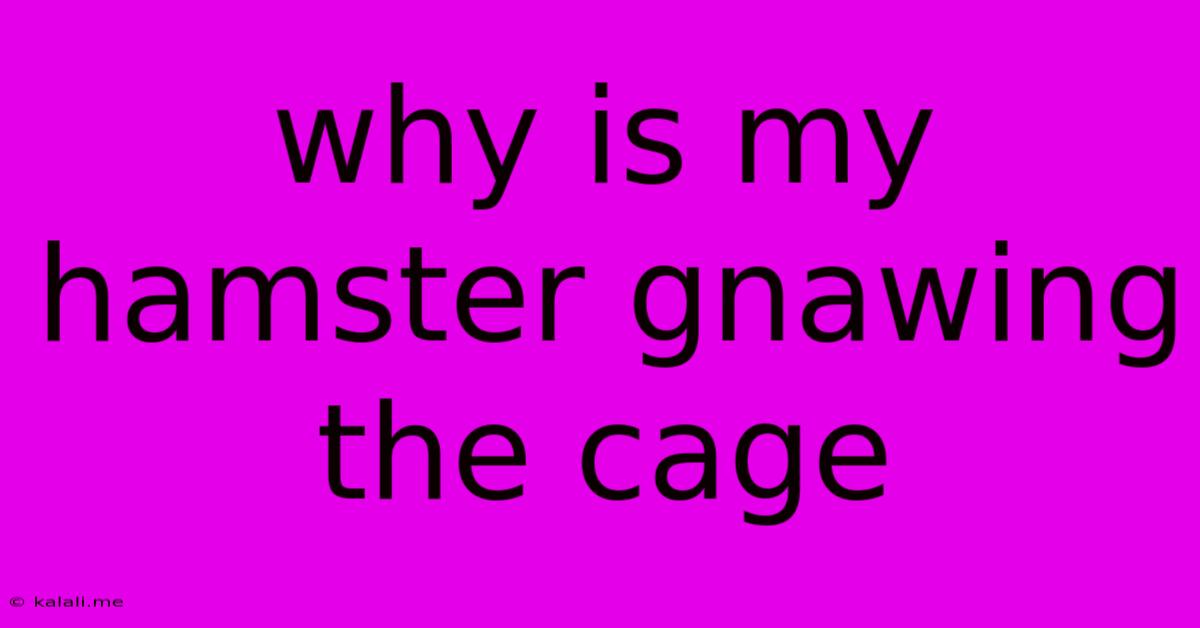Why Is My Hamster Gnawing The Cage
Kalali
May 22, 2025 · 3 min read

Table of Contents
Why is My Hamster Gnawing the Cage? Understanding and Preventing Bar Biting
Is your furry friend, your hamster, relentlessly gnawing on its cage bars? This common behavior can be frustrating for owners, but it's crucial to understand the underlying reasons to address the issue effectively and ensure your hamster's well-being. This article explores the various causes of cage gnawing in hamsters, providing solutions to prevent this destructive habit and create a happier, healthier environment for your pet.
Understanding the Root Causes: Why Hamsters Chew Cage Bars
Hamsters, by nature, are chewers. Their teeth grow continuously, requiring constant gnawing to keep them at a manageable length. However, excessive cage bar gnawing often signals something more than just natural tooth maintenance. Several factors can contribute to this behavior:
Boredom and Lack of Enrichment
A frequently overlooked cause is boredom. Hamsters are intelligent creatures that need mental and physical stimulation. A monotonous environment devoid of toys, tunnels, and opportunities for exploration can lead to frustration, manifesting as cage gnawing. Think of it as their way of relieving stress and seeking entertainment.
Insufficient Chewing Toys
While hamsters naturally chew, providing insufficient or inappropriate chewing toys can also cause them to resort to the cage bars. Ensure a variety of chew toys are available, made from safe materials like wood (ensure it's untreated!), cardboard, and safe plastics. Rotate toys regularly to keep things interesting.
Nutritional Deficiencies
In some cases, gnawing can be linked to nutritional deficiencies. A diet lacking in essential nutrients can lead to a hamster's body seeking these nutrients elsewhere, including the cage bars. Ensure your hamster's diet consists of high-quality hamster food, fresh vegetables, and occasional healthy treats.
Stress and Anxiety
Environmental stressors, such as loud noises, sudden movements, or the presence of other pets, can trigger anxiety in hamsters. This stress can translate into excessive chewing as a coping mechanism. Creating a quiet, secure, and predictable environment is essential for their well-being.
Medical Issues
While less common, underlying medical conditions like dental problems or malocclusion (misalignment of teeth) can cause discomfort and lead to increased chewing. If your hamster exhibits unusual gnawing patterns alongside other symptoms like lethargy or changes in eating habits, a veterinary checkup is recommended.
Cage Size and Type
An inappropriately sized cage can contribute to stress and boredom. Hamsters need ample space to explore, exercise, and engage in natural behaviors. Ensure your cage provides sufficient space for running, burrowing, and hiding. The material of the cage also matters; some hamsters are more prone to gnawing wire cages than solid plastic or glass ones.
Practical Solutions to Prevent Cage Gnawing
Now that we've identified the potential causes, let's look at practical steps to address the problem:
- Enrichment is Key: Provide a diverse range of toys, including wheels, tunnels, hideaways, chew toys, and climbing structures. Rotate these toys regularly to keep your hamster engaged and challenged.
- Dietary Optimization: Offer a balanced diet of high-quality hamster food, fresh vegetables, and occasional healthy treats. Consult a veterinarian or experienced hamster owner for dietary recommendations.
- Stress Reduction: Minimize noise and sudden movements near the cage. Ensure your hamster has a quiet and safe space to retreat to.
- Regular Veterinary Checkups: Schedule regular checkups to address any potential health issues that might contribute to gnawing.
- Cage Upgrade (if necessary): If you suspect the cage size or type is a factor, consider upgrading to a larger, more suitable enclosure. Solid-bottomed cages are often preferred to reduce the risk of foot injuries and prevent gnawing on wire mesh.
- Provide Alternative Chewing Materials: Offer a variety of safe chew toys to redirect the gnawing behavior away from the cage bars.
By addressing these underlying causes and implementing these solutions, you can significantly reduce or eliminate your hamster's cage gnawing behavior, creating a harmonious and enriching environment for your small pet. Remember that patience and observation are crucial in understanding your hamster's individual needs and preferences.
Latest Posts
Latest Posts
-
Can You Bring A Safety Pin On A Plane
May 22, 2025
-
S Il Vous Plait In English
May 22, 2025
-
Charging A Phone With Another Phone
May 22, 2025
-
Can Fajr Be Prayed Before Sunrise
May 22, 2025
-
Why Is Facebook Blue In Colour
May 22, 2025
Related Post
Thank you for visiting our website which covers about Why Is My Hamster Gnawing The Cage . We hope the information provided has been useful to you. Feel free to contact us if you have any questions or need further assistance. See you next time and don't miss to bookmark.